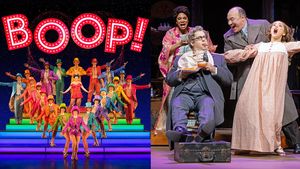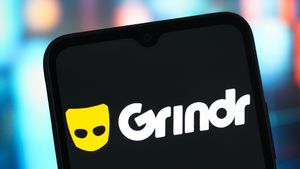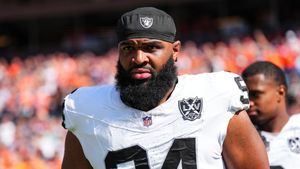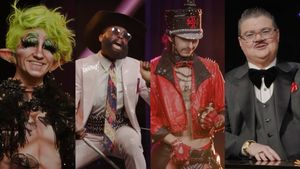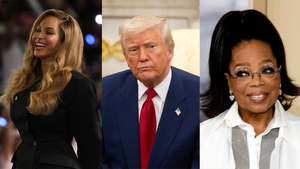I started wearing camouflage in February 2025. It began with a green camo cap I casually picked up at Target. Once I put it on, the cap seemed to summon brown and tan work pants, heavy boots, and a jacket meant for moving unseen in the woods. With my olive skin, though, camo washes me out, making the dark patches beneath my eyes more noticeable.
Camo is made for hunters and soldiers—not someone like me, who sparkles in winter tones: reds, icy blues, and every shade of black.
The seeds of my transformation began during Donald Trump's second inauguration weekend. As I rode the DC Metro, young men stood out in brown, green, and beige camo, topped with red "Make America Great Again" caps. In Trump's America, camo has become the unofficial uniform of his supporters. For people like me, it became a tool for blending in and staying safe.
My wardrobe quickly assembled itself from Goodwill and Dick's Sporting Goods, and would have soon buried me if it weren't for a trip to Tractor Supply. There, I spotted "lady camo" splashed with pink and white. It jarred me back to myself, a fem gay man in rural Pennsylvania once again attempting to hide in plain sight.
I repented on the spot, collected all the camo hunting wear and bland work clothes, and donated them to the Salvation Army. I turned to Poshmark for brightly colored, tailored shirts, sweaters, and pants from designers whose clothing, or even knock-offs, never once appeared on the racks of our local Boscov's department store.
I inherited shapeshifting from my Italian-American family, who adapted to America for over one hundred years. Officials assigned my ancestors a skin tone at Ellis Island: "sepia." In 1960, my parents moved from the South Bronx to suburban Connecticut, embracing whiteness, driving a faux-wood-paneled Ford station wagon, and sipping cocktails with our WASP neighbors. In 1982, at age 17, I left Catholicism and came out as a born-again Evangelical anti-gay Republican.
Like so many trying to blend into America's melting pot, I learned how to hide who I was to survive. Conversion therapy ministers taught me how to walk and talk like a real man. Evangelical pastors taught me how to be a zealot for White Christian Nationalism, harassing women outside abortion clinics and standing on street corners preaching against homosexuality.
Then, by age 33, I eventually and inevitably came out gay.
My metamorphosis was not unique. Consider the convoluted plot and real-life drama in the 1961 Doris Day and Rock Hudson comedy Lover Come Back. Day portrayed Carol Templeton, a principled ad executive. Hudson, who was secretly gay, played Jerry Webster—a macho ad man. Hiding his homosexuality, Hudson played an aggressive butch character who then performed a softer than traditional masculinity.
Straight men play gay as comedy; gay men play straight to survive. By the late 1990s, society had shifted, and coming out had become an exhilarating experience. In the 2000s, I spoke openly against conversion therapy, urging authenticity. I felt safe in a welcoming society.
Today, we are slipping backward. Transgender and non-binary people are targets of an oppressive government, alongside immigrants and pro-Palestinian activists. In a disheartening echo of past betrayals, I see some middle-class, cisgender gay men, their fight for marriage equality a recent memory, now attempting to divorce the LGB from the T. A transparent bid for acceptance from figures who once stood against their very existence.
This isn't the first time segments of the gay community sought gains by leaving others behind. Consider the infamous ENDA debacle in 2009, when Rep. Barney Frank, an openly gay member of Congress, reintroduced the Employment Non-Discrimination Act, deliberately excluding transgender protections – a clear statement that for some, the "L" and "G" could advance while the "T" was left to fend for itself.
Similarly, after achieving victory with marriage equality, some established LGBTQ+ organizations reduced their focus or even disbanded. Like George W. Bush standing on an aircraft carrier under his Mission Accomplished banner, these LGBTQ+ organizations glossed over all that was left undone and the inevitable backlash from the Right. The current push to sever the LGB from the T is a painful reminder that, for some, solidarity is a fair-weather concept, and the hard-won unity of our community remains tragically fragile.
How many camo-clad, MAGA-supporting young men my husband and I saw descend upon DC are suppressing gay desires or trans identities? How many, like I did, will stay in hiding until the coast is clear? Being openly queer now means facing renewed risks. Fear of retaliation is everywhere right now. Like invisible gas, it builds pressure, spreading from sexuality into politics, protest, and public life.
Resistance feels deviant and costly. Many will shout online, but when push comes to shove, they join oppressors or silently assent. Some, like me, must rebel against the temptation to camouflage ourselves and flaunt our differences, perhaps fully clad head to toe in designer rainbow camo.
Coming out in defiance demands courage. Tragically, those who play it safe are often rewarded, even when that safety comes at a terrible cost.







































